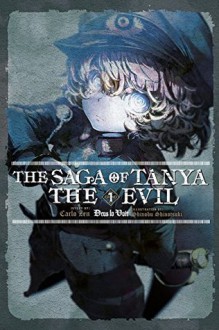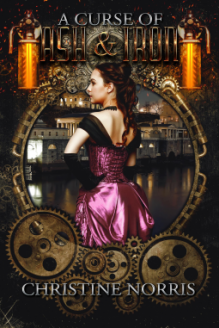
Note: Due to the way this book handles religion and religious belief, devoutly religious people should probably approach it with caution.
The main character of this book used to be a Japanese salaryman (his name is never mentioned). Specifically, he worked in HR and did layoffs. One particularly upset person he'd just laid off pushed him in front of a train, landing the salaryman in front of Being X, aka God. Being X, annoyed at having to deal with yet another unbeliever, decides to put the salaryman in a position where he will be forced to believe in God. And so the salaryman is reborn in a new world, as an infant girl named Tanya. He retains his personality and memories of his former life but is forced to deal with the limitations of Tanya's body. At age 8 Tanya joins the military, and the book covers Tanya's time there from age 9 to 11, as she rises up in the ranks during the start of this world's first world war.
Tanya's new world is very similar to Germany just before World War I. In fact, the book begins with a map of Europe, labeled with new country names (except the United States, which is allowed to remain the same for some reason) - Tanya is a soldier for the Empire. Somehow, Tanya's interest in economics (and psychology and history?) and experience in Human Resources translate to "military genius" in this new world.
First, a note about pronouns and gender. The salaryman is male, and Tanya is female. The salaryman still thinks of himself as male, even in Tanya's body, but he is also fairly disconnected from Tanya, to the point that it shows in the writing. Although the bulk of the book is from the salaryman's perspective and he occasionally uses first-person pronouns, he often talks about Tanya in the third person, using feminine pronouns, as though she were a separate being. I couldn't find any rhyme or reason for when he'd use "I" vs. "she" - it seemed, at first, to be linked to whether he was talking about physical actions ("she") rather than purely thoughts ("I"), but that wasn't always the case. In the thick of battle, for example, the salaryman tended to use "I," even when describing actions he performed with Tanya's body.
Anyway, I bought this because reviews frequently described it as better written than most recent light novels. I'm not sure I'd agree. Yes, Zen clearly did a lot of research, and yes, certain scenes and passages were really good. But like many recent light novel authors, Zen didn't know how to do decent story pacing and got too bogged down in the nitty gritty details of favorite topics at the expense of story and characters. I was more tolerant of Zen's reliance on first-person POV, because it was occasionally fun seeing the disconnect between Tanya's perspective and how other characters perceived her and her actions, but in the latter half of the book it wasn't uncommon for me to not know whose perspective I was dealing with until several paragraphs or even a whole page or two into a scene. Characters' "voices" were just too similar.
Then there were the time skips. At two points, the story skipped forward in time about 30 or 40 years, for about 5 pages total. The first time this happened, it seemed to serve the same function as foreshadowing, hinting at something that would be happening soon in the main narrative but doing so via reporters in the future researching the war years after it was over. The second time skip, though...I don't know. Pretty much pointless.
I'm not a big military fiction reader, and I don't know much about the World Wars beyond vague memories of having to learn dates and events in high school. I'm not really the intended audience for this book. That said, I've enjoyed jargon-filled military fiction before. Even if I had trouble following the big picture strategies, this could have kept me hooked with its character interactions and individual battles. Unfortunately, I had trouble following the battles, and Zen seemed to want to avoid having characters talk to each other and interact outside of battle, so there wasn't as much human interaction as I might have liked either. It didn't help that the salaryman was an antisocial person who viewed people as objects, literal human resources for him to use as needed.
There were parts of this book that hooked me - I enjoyed the scene about the testing and eventual perfection of the Type 95 orb, which veered (unintentionally?) into black comedy, as well as Lergen and Zettour's perspectives on Tanya's actions and behavior and the salaryman's occasional flashes of cynical humor. But there wasn't enough of that, and the parts that I did enjoy could have been executed better.
I don't plan to continue this series and don't know that I'm even interested enough in it to watch the anime.
Extras:
- A map of Europe labeled with all the new country names and coded according to their relationships with the Empire
- A glossy folded sheet with large illustrations on both sides, which includes a timeline of Tanya's life up to age 9
- A 6-page appendix that explains the interior and exterior lines strategies, with maps, and gives an outline of the history of the war up to the end of this book
- An afterword by the author
- Several black-and-white illustrations throughout
- This may be the first light novel I've read with footnotes
(Original review posted on A Library Girl's Familiar Diversions.)


 Log in with Facebook
Log in with Facebook 














